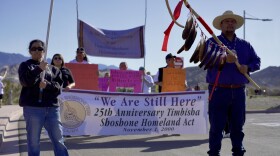Climate change is not a partisan issue. It’s a national and global security issue.
When people are forced from their homes because of drought, they end up as refugees in other areas. This puts a strain on the systems of those who take in refugees. The new people feel marginalized as the old residents feel threatened. That may lead to anger and the susceptibility to radicalization of the refugees.
All because they didn't have enough rain to grow food.
Retired Brigadier General Dr. Stephen Xenakis says that's one scenario that makes climate change a threat to national security. War plays a part in the displacement of refugees, as we have seen in Syria. Any disruption that leads to personal insecurity will lead to global insecurity.
“There are many factors that lead to terrorism," he said, "There are many factors that lead people to do these kinds of violent acts and threaten our country. One of the major factors is how their communities are destabilized.”
He called climate change a "multiplier." It may not be the factor but is one of the several factors that lead to instability. He said when people can't accomplish the simplest parts of life like providing food, shelter and safety for themselves and their family they become desperate.
“When we do our planning and think about what we need to do to keep our country safe and secure, we should keep in mind that the best we can do to sustain people’s communities and support their livelihood can be a major factor in helping us and our national security,” he said.
And General Xenakis is not alone. He's part of a group of former military people, current military leaders, government officials and academics who are warning about the intersection of issues such as climate, energy, and space with U.S. national security.
That group landed in Las Vegas recently, to tour the state's two Air Force bases, and give a talk on how climate change affects the security of our state.
Dr. Maureen McCarthy warns that Nevada is already seeing the effects of climate change, and warns that unless we adapt, the state could see instability of its own.
She points to major floods in the Elko this year, along with several feet of snow in the Reno/Tahoe area. She compares that with the growing bathtub ring at Lake Mead.
"It's getting hotter, and it will continue to get hotter in Nevada." she said.
She's thinking a bump of between five and 10 degrees Fahrenheit on average.
Dr. McCarthy, who is currently a senior researcher in physics at UNR and the Desert Research Institute, says that what we have to worry about is climate extremes.
It won't just get steadily five or 10 degrees hotter, she says. We might experience a few years of 20 degrees higher, then a few with lots of snow, rain, floods and cooler temperatures.
This, she says, will lead to disruption.
"That average is going to come from much more extremes - very low years followed by very high years. Unstable communities, whether they are here in the U.S. or abroad, they are a source of instability," McCarthy said.
Congressman Mark Amodei agrees. He is one of 17 Republican lawmakers who signed on to a resolution expressing a commitment to "conservative environmental stewardship."
Congressman Amodei couldn't appear on our program because of his travel schedule, but his office sent us the following statement:
"In order to legislative effectively, Washington must have a willingness to have frank and honest discussions on the issues that affect us all. I'm pleased to be joining the Climate Solutions Caucus with Congresswoman Bonamici and I look forward to joining the rest of my colleagues in examining fact-based policy and research."
So what can our state and country do about climate change to mitigate the national security issues? Is it too late?
Both Dr. McCarthy and General Xenakis say no.
"If you look climatologically at Southern Nevada - just from a cold calculus of science - nobody should be living here. Quite clearly, this community clearly has learned how to adapt to an extreme environment," McCarthy said, "So it's not bleak. We aren't starting from scratch. We are starting from a place where particularly Nevadans have learned how to adapt."
In his appearance in Las Vegas, General Xenakis also talked about how torture is a national security issue, LISTEN to his comments here.
From Desert Companion: We want you to join the fight against climate change
Retired Brigadier General Dr. Stephen Xenakis; Dr. Maureen McCarthy, climate physicist, University of Nevada Reno, Desert Research Insitute










